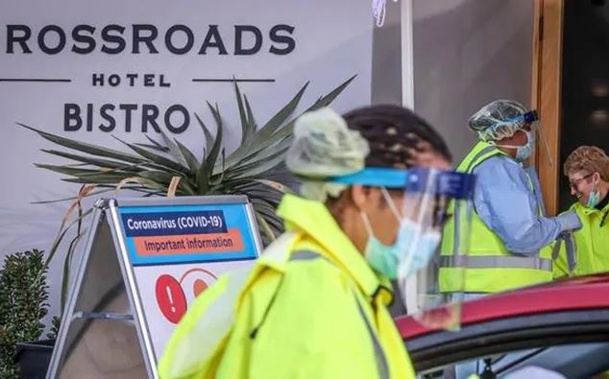
A Melbourne man who doesn't know he's infected with coronavirus walks into a bar on July 3 with "about six" of his workmates. It sounds like the opening line of a bad joke.
But 13 days and 34 Covid-19 infections later, an innocent trip to a busy Sydney pub could lead to a spike in virus cases and send Australia's most-populated city back into lockdown.
Because not only have NSW authorities identified this man, who works for a Victorian freight company, as the likely "patient zero" in the state's burgeoning Crossroads Hotel cluster, but the party he attended at the venue was an example of a superspreader event – where one or a few people unknowingly spread Covid-19 to many others.
"The man from Melbourne didn't think he was particularly unwell, didn't think he was sick with Covid, he travelled on the 30th of June, he's been in NSW for a while," NSW chief coronavirus "detective" Jennie Musto told reporters yesterday.
"And it wasn't until we interviewed him and his colleagues with more detail that we made the link that they were all at the Crossroads on the 3rd of July."
The Crossroads cluster has highlighted Covid-19's ability to spread. But it's also demonstrated that certain individuals who become infected with the virus – so-called "superspreaders" – are more likely to transmit it to a disproportionate number of people than others.
"There's is no precise definition in epidemiological terms of a superspreader," Queensland University of Technology (QUT) epidemiologist Gerry FitzGerald told news.com.au, but they could loosely be defined as "someone who is more likely to spread the illness".
Several contributors increase a person's likelihood of spreading Covid-19, Professor FitzGerald explained, one being "the behaviour and extent of social interaction of the individual".
"Whether someone is a superspreader or not will depend on some combination of the pathogen, the patient's biology and their environment or behaviour," Professor of Entomology and Director of the Centre for Infectious Disease Dynamics at Pennsylvania State University, Elizabeth McGraw, wrote in a piece for The Conversation.
"Some infected individuals might shed more virus into the environment than others if their immune system has trouble subduing the invader.
"Additionally, asymptomatic individuals – up to 50 per cent of all those who get Covid-19 – will continue their normal activities, inadvertently infecting more people."
Environments – everywhere from gyms and restaurants to your own home – can also help nurture a superspreading event.
"Pubs are potentially super-spreading environments," co-host of the ABC's Coronacast podcast, Dr Norman Swan, said on yesterday's episode.
"In a pub you speak more loudly because you've got be heard … and you are drinking therefore you're disinhibited and you're more likely to be laughing, chatting to your mates.
"It's just the environment where if you've got the virus, it's coming out and it's going significant distances."
And as with most things in life, emerging evidence suggests timing is everything, London School of Hygiene & Tropical Medicine's Adam Kurcharski told Science Mag.
Entering a high-risk setting in the period when a person is most infectious with Covid-19 can set off a superspreading event, he explained.
"Two days later, that person could behave in the same and you wouldn't see the same outcome."
A person's behaviours, travel patterns and degree of contact with others can also contribute to superspreading, McGraw said.
All of these factors demonstrate why it's crucial we play by the rules and listen to health advice until there's a vaccine, QUT Professor of Epidemiology Philip Baker told news.com.au.
"Key messages of prevention are social distancing, hand-washing, cough management such as coughing into a sleeve and not one's hand and stay away if you are unwell," he said.
In her article, McGraw agreed, saying that the "right control practices specific to how pathogens are transmitted – handwashing, masks, quarantine, vaccination, reducing social contacts and so on – can slow the transmission rate and halt a pandemic".
Take your Radio, Podcasts and Music with you









